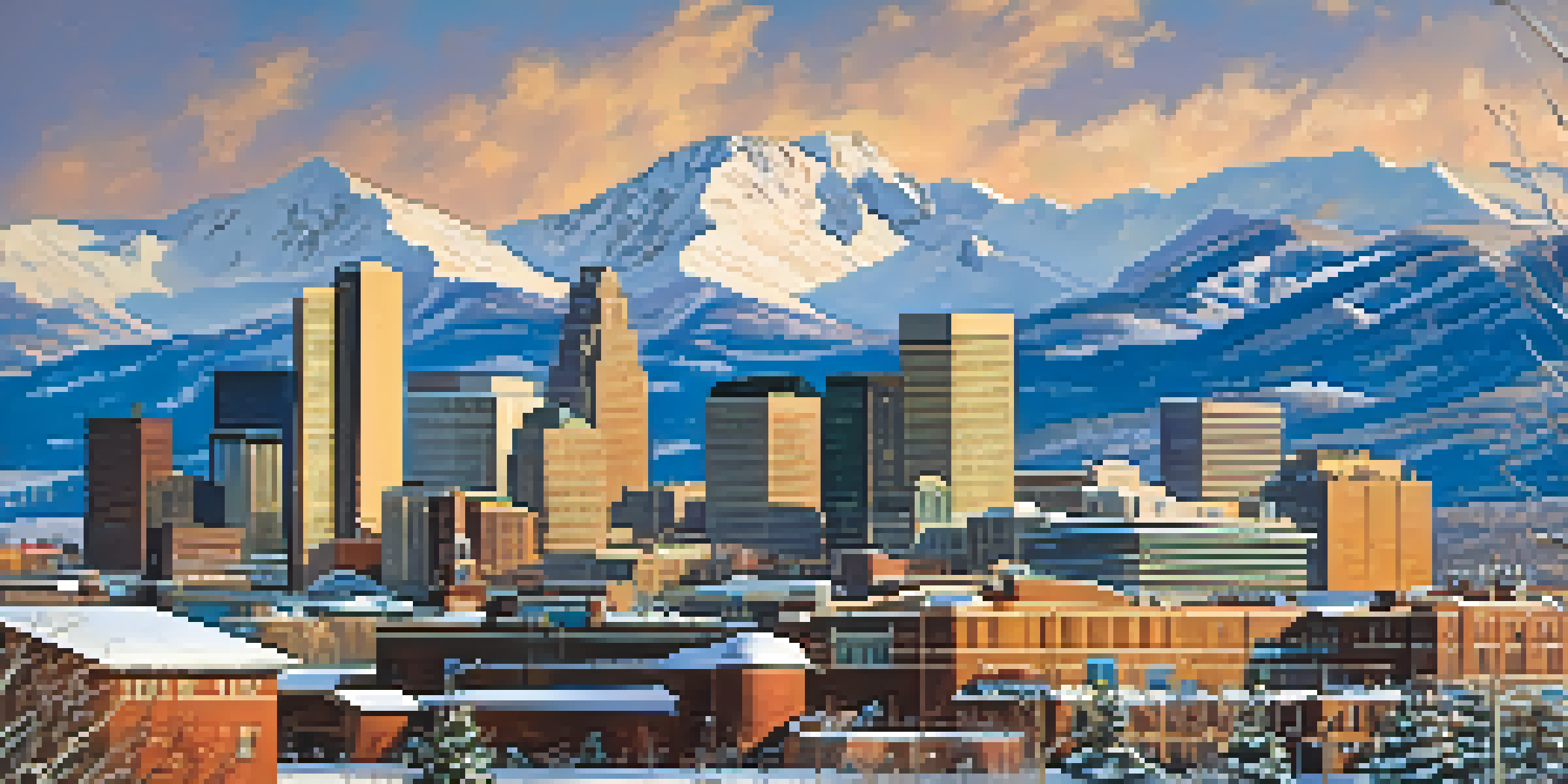Analyzing Seasonal Tourism Patterns in Denver's Economy

Understanding Denver's Tourism Landscape Throughout the Year
Denver, known for its stunning mountain views and vibrant culture, experiences fluctuating tourism patterns throughout the year. Different seasons attract various types of visitors, from winter sports enthusiasts to summer festival-goers. Understanding these patterns helps local businesses tailor their offerings and marketing strategies to meet seasonal demands.
Tourism is an economic lifeline for cities like Denver, creating jobs and boosting local businesses throughout the year.
For instance, ski resorts in the nearby Rockies see a significant boost in visitors during the winter months, while parks and outdoor attractions flourish in the summer. This cyclical nature of tourism not only impacts local businesses but also influences employment patterns within the city. Knowing when the peaks and troughs occur allows stakeholders to better prepare for the influx or decline of tourists.
Overall, analyzing Denver's tourism landscape reveals how interconnected the city’s economy is with the seasons. By recognizing these seasonal shifts, the city can enhance its appeal and ensure that both tourists and residents enjoy what Denver has to offer year-round.
The Economic Benefits of Winter Tourism in Denver
Winter tourism is a critical component of Denver's economy, drawing visitors for its world-class skiing and snowboarding. The influx of tourists during the colder months contributes significantly to the local hospitality industry, including hotels, restaurants, and rental shops. These businesses thrive on the winter sports crowd, creating jobs and stimulating economic growth.

Moreover, events like the Denver Winter Brew Fest and the National Western Stock Show further enhance the city’s appeal in winter. Such events not only attract visitors but also foster a sense of community and cultural pride. As a result, they convert temporary visitors into repeat tourists who come back season after season.
Seasonal Tourism Shapes Economy
Denver's tourism economy fluctuates with the seasons, influencing local businesses and employment patterns.
In essence, the benefits of winter tourism extend beyond just immediate financial gains. The positive economic impact helps sustain local businesses and provides a vibrant atmosphere that enhances Denver's reputation as a winter destination.
Summer Tourism: Festivals, Events, and Outdoor Activities
As the snow melts, Denver transforms into a hub for summer tourism, filled with festivals, concerts, and outdoor activities. The warm weather draws in visitors eager to explore the city's parks, gardens, and the nearby mountains. Events like the Denver Arts Festival and the Colorado Dragon Boat Festival showcase local talent and culture, attracting crowds and generating revenue.
Sustainability in tourism not only protects the environment but also enhances a destination's appeal to conscious travelers.
Outdoor enthusiasts flock to the city for hiking, biking, and river rafting, further boosting the local economy. Businesses catering to these activities, such as tour operators and equipment rental shops, experience a surge in demand. This seasonal spike not only enhances the vibrancy of the city but also creates job opportunities in various sectors.
Ultimately, summer tourism plays a crucial role in diversifying Denver's economic landscape. By embracing its summer offerings, the city can create a balanced economy that benefits from year-round tourism.
The Influence of Fall Tourism on Local Business Strategies
Fall in Denver brings a unique charm that attracts tourists for activities like leaf-peeping and harvest festivals. The changing foliage creates picturesque scenery that draws photographers and nature lovers alike. As visitors flock to see the vibrant colors, local businesses leverage this seasonal interest to promote their products and services.
Events such as the Great American Beer Festival in October not only highlight local breweries but also boost hotel bookings and restaurant sales. Businesses often prepare special autumn-themed menus and promotions to capitalize on the influx of tourists. This adaptability showcases how local businesses can thrive by aligning their offerings with seasonal trends.
Winter Tourism Drives Economic Growth
The winter season significantly boosts Denver's economy through increased visitors for skiing and related events.
In summary, fall tourism serves as a reminder of the importance of strategic planning for local businesses. By anticipating seasonal changes and adjusting their strategies, Denver's economy can continue to flourish throughout the year.
Analyzing the Impact of Seasonal Tourism on Employment Trends
Seasonal tourism significantly influences employment patterns in Denver, leading to fluctuations in job availability throughout the year. Many businesses hire temporary staff to accommodate the influx of tourists during peak seasons, which can create job opportunities for local residents. However, this also leads to a challenge for those seeking stable, year-round employment.
In winter, for example, ski resorts and hospitality sectors ramp up hiring to meet demand, resulting in a surge of seasonal jobs. Conversely, these positions may dwindle in the off-season, highlighting the need for adaptable workforce strategies. Understanding these trends allows policymakers and educators to better prepare the workforce for seasonal shifts.
Ultimately, recognizing the relationship between tourism and employment trends is crucial. By fostering a diverse job market and offering training programs, Denver can mitigate the challenges posed by seasonal fluctuations, ensuring a more resilient economy.
Challenges Faced by Denver's Tourism Sector Year-Round
Despite its thriving tourism industry, Denver faces several challenges that impact its economy throughout the year. From unpredictable weather patterns to economic downturns, these obstacles can create uncertainty for local businesses. For instance, a mild winter may lead to fewer ski visitors, affecting everything from rentals to hotel bookings.
Additionally, the COVID-19 pandemic has reshaped the tourism landscape, prompting businesses to adapt quickly to new health and safety protocols. As travelers become more selective about destinations, Denver must work to enhance its appeal through effective marketing and innovative experiences. This adaptability is key to navigating the challenges that seasonality brings.
Emerging Trends in Tourism Practices
Sustainable and experiential tourism trends are reshaping Denver's appeal, attracting conscientious travelers year-round.
In conclusion, while Denver's tourism sector offers significant economic benefits, it must also confront various challenges. By acknowledging these issues and implementing proactive strategies, the city can maintain its status as a premier travel destination.
Future Trends in Denver's Seasonal Tourism Economy
As we look to the future, several trends are emerging in Denver's seasonal tourism economy. One notable trend is the increasing demand for sustainable tourism practices, as travelers become more conscious of their environmental impact. This shift encourages local businesses to adopt eco-friendly initiatives, which can enhance Denver's appeal as a responsible travel destination.
Another trend is the rise of experiential tourism, where visitors seek immersive experiences rather than traditional sightseeing. Activities like guided nature hikes and cultural workshops are gaining popularity, prompting businesses to diversify their offerings. By catering to these evolving preferences, Denver can attract a broader range of tourists throughout the year.

Ultimately, staying ahead of these trends will be essential for Denver's tourism economy. By embracing sustainability and experiential opportunities, the city can not only maintain its competitiveness but also foster a vibrant and sustainable tourism environment for years to come.